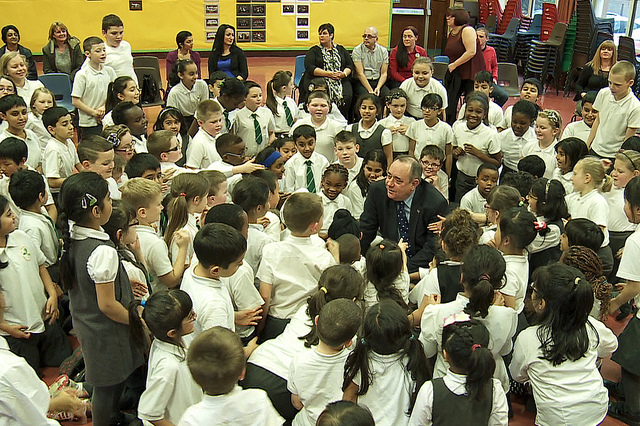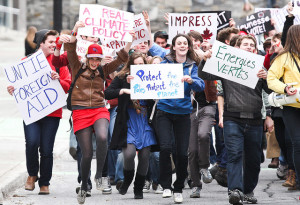Voter registration levels for the Scottish independence referendum are already showing the potential benefits of lowering the voting age to 16
16 and 17 year olds will be allowed to vote in the Scottish independence referendum in September. Kyle Thornton, Chair of the Scottish Youth Parliament, welcomes this move and explores how young people are responding to the opportunity. Responding to recent posts by Craig Berry and Andy Mycock & Jonathan Tonge, Thornton argues that giving 16-17 year olds the vote can improve participation in the long term by getting them into the voting habit earlier.

“Who wants to vote in the independence referendum?” Credit: Scottish Government, CC BY-NC 2.0
On the 18th September this year, for the first time in UK political history, 16 and 17 year olds (in Scotland), will have the right to vote in the Scottish independence referendum. This extension of the franchise is something that the Scottish Youth Parliament believe can only enhance democracy through greater engagement with young people. I will argue that votes at 16 provides benefits in registration and engagement that simply cannot be replicated within the 18-24 age group alone and that by successful engagement at 16 and 17, we can then increase overall turnout.
By the extension of the franchise, we have learned a great deal already, especially in terms of registration. The Scottish Youth Parliament, when deciding to take a neutral stance on the question of independence, made a very clear commitment to dedicate our work up until September on registration and engagement. While the success of engagement will find its true measurement on turnout, we can see that in the lead up to the referendum organisations, such as ourselves, have had a great deal of success with registration. In March 2014, the Scottish Government reported that over 80% of 16 and 17 year old voters in Scotland had registered to vote, which when compared to the UK wide figure for 18-25 year olds of 55% shows that there is a clear improvement in registration with 16 and 17 year old electors. The question is then posed, why is this?
It is true that increased media attention on this referendum will have helped boost registration and also that this is the first time 16 and 17 year olds can vote which will also have an effect. However from our experience, as an organisation that has worked to register both 16 and 17 year olds and 18-24 year olds, we have found the ability to register younger voters is much improved. The primary reason is that it is much easier to engage with 16 and 17 year olds as we can find “captive audiences” in schools and colleges with 75% of young people staying on past the age of compulsory education in Scotland.
With the support of education professionals, we have been able to deliver impartial education to young people and convince the majority of them that while they may be undecided on how to vote, they need to register to have that choice at all. This has demonstrated to us that the extension of the franchise to all elections and referenda across the UK could have a significant positive impact as the registration of electors in this age group would prove much easier.
However, the ability to improve registration is not the only benefit that the education system brings to improving engagement in the 16-17 year old age group. Using the idea of “captive audience”, neutral organisations like ourselves are able to run engagement sessions (which we call Democracy Days) which educate on the basic facts, provides space for the parties to ‘make their pitch’ and give young people the ability to question politicians, engage in issues they care about and give thought to their own political beliefs. Indeed, the only sentiment we try to impart on these days is that voting is important no matter how you vote and for the sake of the health of our democracy, we should all be agreed on this principle.
Whilst I cannot tell you the turnout of 16 and 17 year olds yet, ScotCen research has shown that over 66% of newly enfranchised voters intend to vote in the referendum. While the importance of this decision will, we would imagine, increase turnout, I also argue that it is the non-party political nature of this plebiscite which is also going to boost turnout. It shows that when you give young people a clear choice of pathways, they will turn out to support their chosen course. It also, I believe, indicates that if the body politic moved to a more inclusive type of politics, we could see improved turnouts in general.
The main lessons that we have learned in engaging young voters is that by developing the ability and approach to systematically engage with a group that traditional politics works to disengage, we are able to see greater registration, and it early signs show that we will also see greater turnout. It is also clear from our work that we are able to have much greater access to 16 and 17 year old electors than those 18-24 years old. Looking towards the future, I hope that this ‘cohort’ of electors will have generally higher levels of engagement in elections going forward as they will have taken the crucial first steps of registering to vote and actually casting a ballot. My message to those voters is that they have two responsibilities in this referendum: firstly, to decide the future of the country; and secondly, to show that 16 and 17 year olds, when registered and engaged, will turn out and vote like any other group. By focusing on meaningful engagement, we can boost our democracy by extending this to all 16 and 17 year olds.
Votes at 16 is no magic bullet to our troubled democracy but the referendum on independence in Scotland has shown very clearly that not only are 16 and 17 year olds more interested in the democratic process than their 18-24 year old counterparts but that it is much easier for ‘electoral professionals’ such as registration officers and youth workers to engage with them. If we can get our 16 and 17 year olds interested, we have a much better chance of creating voters for life.
—
This post is part of a series on youth participation based on the Political Studies Association project, Beyond the Youth Citizenship Commission. For further details, please contact Dr Andy Mycock. An electronic copy of the Beyond the Youth Citizenship Commission: Young People and Politics volume can be downloaded here.
Note: This post represents the views of the author and does not give the position of the LSE or Democratic Audit. Please read our comments policy before commenting. Shortlink for this post: buff.ly/1kINL3a
—
 Kyle Thornton is the Chair of the Scottish Youth Parliament. He represents Glasgow Southside and is currently a student at Glasgow University.
Kyle Thornton is the Chair of the Scottish Youth Parliament. He represents Glasgow Southside and is currently a student at Glasgow University.






 Democratic Audit's core funding is provided by the Joseph Rowntree Charitable Trust. Additional funding is provided by the London School of Economics.
Democratic Audit's core funding is provided by the Joseph Rowntree Charitable Trust. Additional funding is provided by the London School of Economics.
If you have not already, check out @kyleakthornton’s article about the impact of #votesat16 on voter registration: https://t.co/C0Q0ATRCcY
Voter reg levels for the Scots independence referendum already show the potential benefits of lowering the voting age https://t.co/Rr4W72VyLH
What has been impact of votes at 16 on Scottish independence referendum? @kyleakthornton shares experience so far https://t.co/nd3oheEQIE
#Votesat16 has positive impact on Scot indy ref voter registration https://t.co/WHTQ0KA4Fn @UKYP @StudentVoiceUK @citizenship @NCVYSYOUTH
MT @Democraticaudit “Votes at 16 in #indyref is already having an impact on registration levels says @OfficialSYP https://t.co/mgLNwE9Poo “
@Votesat16 in Scottish indy ref has positive impact on voter registration https://t.co/WHTQ0KA4Fn @bellacaledonia @GerryHassan @Radical_Indy
MT @democraticaudit: Votes at 16 in #indyref already having impact on registration level @kyleakthornton @OfficialSYP https://t.co/VFReQqJcAd
Check out my post as part of the LSE Democratic Audit project on the trends in registration seen with Votes at 16 https://t.co/S8YP4b48ni
Voter registration levels for the Scottish independence referendum are already showing the potential benefits of… https://t.co/DYDvTDKJwy
@OfficialSYP on impact of #votesat16 in Scotland on voter registration https://t.co/iifyHu3gke @HansardSociety @LibDems @UKScotland
@OfficialSYP on impact of #votesat16 in Scotland on voter registration https://t.co/iifyHu3gke @SarahChampionMP @SadiqKhan @UKLabour @theSNP
@OfficialSYP on impact of #votesat16 in Scotland on voter registration @electoralreform @bycLIVE @ElectoralCommUK https://t.co/iifyHu3gke
@EvaZeglovits @hammersmithandy @HuffPostUKPol read about impact on voter registration of @votesat16 @OfficialSYP https://t.co/iifyHu3gke
Votes at 16 in Scottish referendum is already having an impact on registration levels, say Kyle Thornton @OfficialSYP https://t.co/2HrYenAJna
Voter registration levels for Scottish independence referendum already show the benefits of cutting voting age to 16 https://t.co/LKJo2z2ood
Voter registration levels for the Scottish independence referendum are already showing the potential benefits of… https://t.co/vGxSJr7S9K